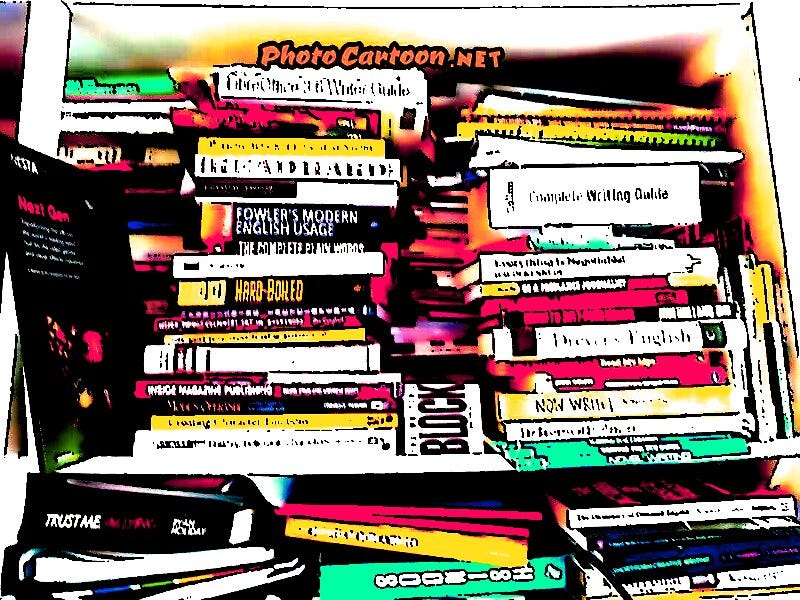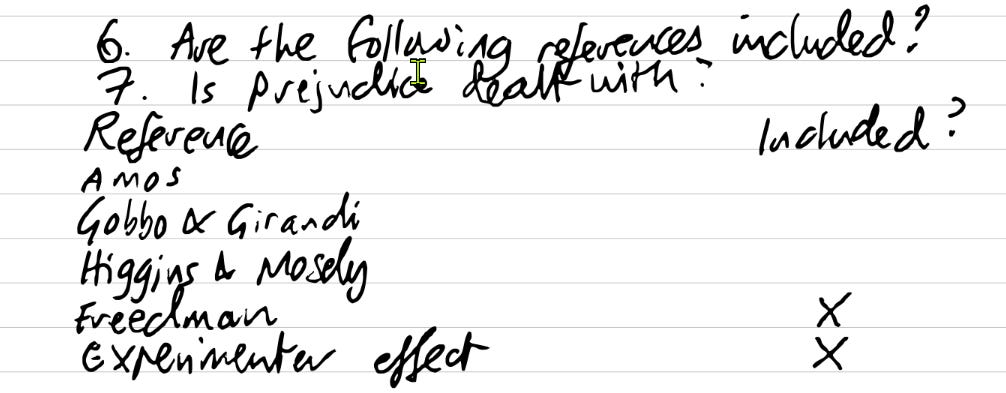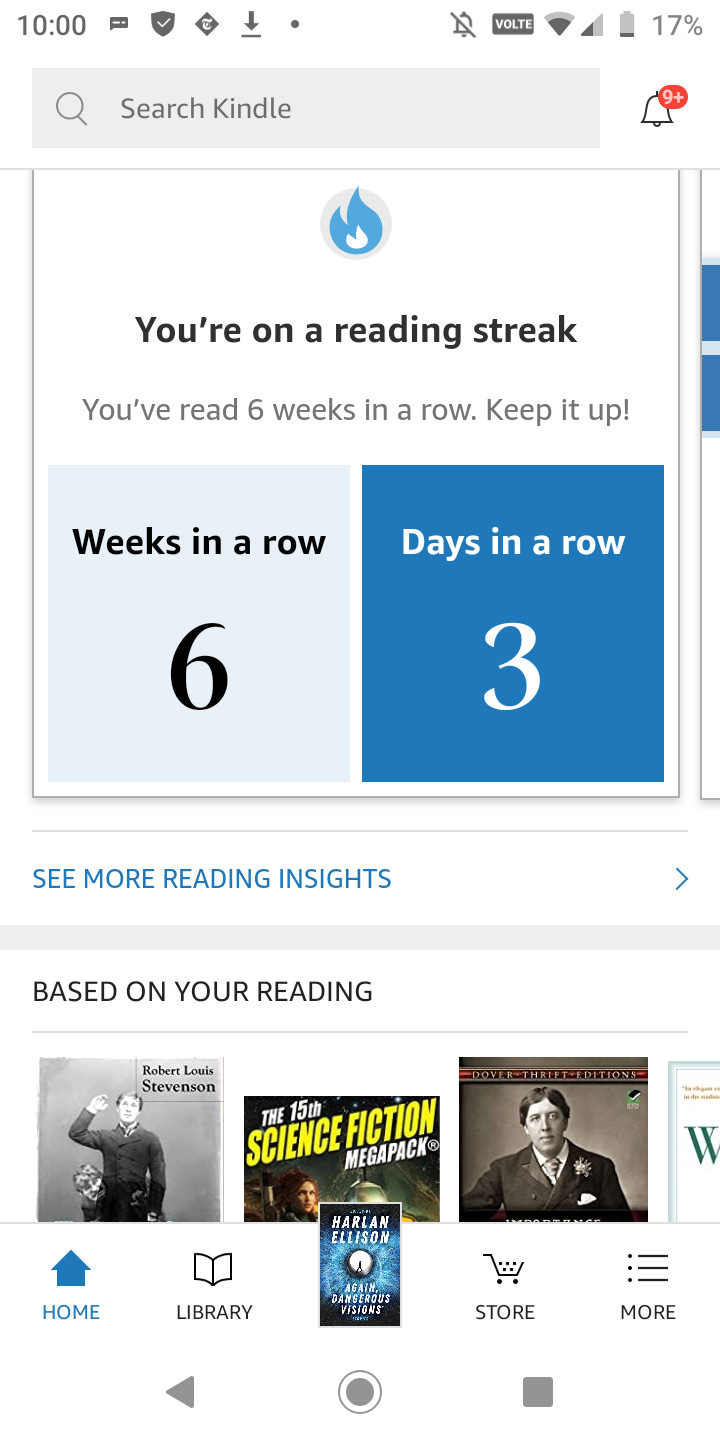How I read 4 books -- and reviewed them -- in under a week -- NOW FREE TO ALL!
Read on for my super top tips on how to read efficiently
Greetings!
When it comes to reading, most people approach the material in the same way they approach a packet of cornflakes. In an age of information overload, that just isn’t good enough. You have a job to do: not only to keep up-to-date for your own sake, but to do so in order to keep your supervisor and others informed1. How will you do it? The following suggestions inform the way I approach nonfiction books that I have been asked to review.
9 Great Tips For Reading More Efficiently
If the material is well-structured — in other words, if the person writing it was more concerned with making sure you could get the gist quickly than with his or her own ego — efficient reading should be as easy as falling off a log2. But even if the writer spent more time thinking of flowery descriptions than worrying about your need to get stuff done, you can still save time by reading it properly.
Here's what you do:
Don't Even Open The Document
That's right: just keep it closed, and spend some time thinking about what you're looking for, and what you think the document might contain in relation to that. It may sound like a waste of time but it isn’t, because what you're doing is setting up some mental hooks on which to hang ideas as they come up from the material, or from your interaction with the material.
That’s what I did with each of the four books I alluded to in the title of this post. I looked at the title and subtitle, and while shopping or driving or walking around I thought about what I might find within the pages.
Here, for instance, is a screenshot of some of the notes I made to remind myself of what I’d thought about in this pre-reading stage:
As I know something about the book’s subject, there were certain references to research that I would hope/expect to see, hence the table.
Read The Table Of Contents…
… if there is one, as that will help you get a feel for what the document contains. Well, with any luck: if the author has used totally unhelpful section or chapter headings, like "All's well that ends well", or “All that glisters” you won't have much joy. I hate tables of content that form, in effect, a guessing game. Why not just say what the chapter is about?
Always Start At The End
Well, at the summary, to be more precise. That sometimes comes at the beginning, in the form of an Executive Summary. Whatever. Read it first, because you'll be able to cut to the chase without all the intervening argument. As the saying goes: just gimme the facts, ma'am.
I tend to read the Introduction and the Foreword as well, because they will give a good flavour of what the book is about. If there are introductions and conclusions at the beginning and end respectively of each chapter, I read those next — see also the next point.
I do not bother with the blurbs of the great and the good that may appear on the back cover or as part of the front matter. The publishers are not going to include anything like “This book sucks”. Moreover, everyone who is called on to provide a blurb has a vested interest in praising the book in case the author is asked to review their book in due course. Sorry for the cynicism, but experience informs me that it is well-placed. If you’re cynical about my authority here, that’s fine, but in that case I urge you to read these articles:
Read Even More
If you still don't have what you need, well, you're going to have to read more of it. Start by reading the first and last paragraphs in each section. The first one should say what is covered. If you've chosen a good source, the final paragraph will summarise what's just been covered.
Read Still More
Still not enough? OK, start again, but this time read the first sentences in each paragraph too.
The Big Picture
You can put these techniques together to read a newspaper quickly: the headline and first paragraph, plus the picture and picture caption, should tell you all you need to know. That assumes the article is a news article and has been written in accordance with the approach known as the “inverted pyramid”. This is where the key questions — what, where, who, when, why — are answered in the first paragraph, with subsequent paragraphs providing further detail.
Read The Tags
Good website articles and blogs should help in two other ways: firstly, they ought to be short (unlike this one: sorry!); secondly, they should be tagged — and the tags should give you a good idea of what the piece is about.
Faster Reading
Efficient reading isn't the same as speed reading, but you can always do some things to help you read faster:
How Much Detail?
Ask yourself if you really need all the detail. If the answer is "no", then you can skim-read the document. A good way of doing this is to train yourself to look out for certain "signpost" words — and then ignore the rest of the sentence.
For example, "for example" is an obvious kind of signpost: it tells you that there is an example coming up. Duh. Well, if you already get the point, or you don't need the detail, why waste time reading an example?
Another signpost word is "Moreover": that is often used to embellish a point, and whilst it isn't the same as an example, if you're in a hurry you might want to skip it. At least for now.
Take In More Words At A Time
Another thing you can do is to read more words at once. You can train yourself to do this, and there is software that can help you. I tried one application out a few years ago, but it seems to have disappeared now. No problem, because there are lots of others, as a search for “speed reading” on the internet will show. For example:
The six best speed reading apps of 2023
I haven’t used any of those apps, but I suspect the principles are similar to the one I did try. That one tested your reading speed and comprehension, and trained you to see more words at once. The reading/comprehension test was a little artificial: in a real context, you would probably have some familiarity with the subject matter, hopefully some interest in it, and almost certainly some forewarning of it. As for the section that trained you to read more words at once, I'm not sure how permanent the results are, but there's nothing to be lost by trying it out.
By reading efficiently, you can become more knowledgeable about more things more quickly.
How to read a book a week
I've just read a great post by Kevin Nguyen. Called How to read a whole damn book every week, the article gives some great tips on how to read a lot.
On the whole, Kevin's advice is pretty sound. I especially like the suggestion of using the commercial breaks in live tv programmes to grab some quick reading time. Mind you, I think a lot of people tend to record programmes to watch later, so they can skip the ad breaks completely. If that applies to you, then you might consider 'gaming' your own system in order to eke out more reading time3.
Another suggestion is to read a book first thing in the morning rather than in bed at night. He is right when he says that the latter tends to result in not much reading because you come over sleepy. I sometimes have the opposite problem, that of getting so involved in a book that it's one in the morning before I know it.
At the moment I tend to use the first part of the morning to read blog posts, news and emails. But I may try reading a couple of pages of a book too, to see how it goes.
One suggestion I didn't entirely agree with is to give up on a book if it's too much like hard work. I do tend to do that with fiction: I have a ridiculously low boredom/frustration threshold, sometimes even just a few sentences4. However, with non-fiction books I tend to hope that the knowledge I'll gain from reading the book will outweigh the discomfort experienced in doing so. Also, if I’ve been asked to review then I have to persevere, but if it’s a real uphill slog to get through it because it’s virtually unreadable then I’ll feel obliged to mention that fact in my review.
Generally speaking, if you use efficient reading techniques like the ones outlined above then you can get through a book at a very fast rate indeed.
I don't know if I do read a book a week, because of the number of books I have on the go at any one time. For example, at the moment I'm reading three books, and recently I picked up another one from the library.
When I read on a Kindle I sometimes am presented with an incredibly patronising message like this one:
Kevin's fast reading system consists of making use of every spare moment, whether that's lining up at the bus stop (cue phone or Kindle) or on a long commute (ditto). I have to say I tend not to read a device at bus stops, because it's too easy to be mugged: I tend to read a print book instead.
One thing that Kevin didn't consider is using efficient reading techniques like the ones I’ve suggested in the first part of this article. You can read a newspaper in 20 minutes, and a non-fiction book in a few hours. The techniques, though, don't much lend themselves to reading novels in my opinion.
Thoughts?
By the way — and here’s a bit of unsubtle marketing coming up — if you have a friend you think might benefit from reading these “insider” posts then you can give them a gift subscription. I mean, Christmas is coming up soon-ish, and you wouldn’t even have to bother with gift-wrapping. You know it makes sense.
If you’re a freelancer, this still applies because your supervisor is, in effect, your client, or yourself.
Have you ever considered what a weird expression that is?
I tend to read my phone while waiting for tea to brew. As I drink a lot of tea I get a lot of reading done that way.
OK, I’ll come clean: I often get bored before I’ve completed the very first sentence. When that happens, I don’t waste any more time on it.





"...what you're doing is setting up some mental hooks on which to hang ideas as they come up from the material, or from your interaction with the material." This is my favorite of all the super top tips.
Also, reading the first and last paragraphs of each chapter and "signpost words." Very clever.
Thanks for pointing me towards this article Terry. It aligns well with the Mortimer Adler book.